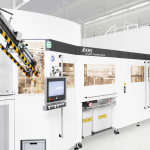
The Bundesrat (upper house of German parliament) recently voted in favor of extending the mandatory deposit on containers to cover all non-returnable plastic bottles and beverage cans. This is good news for the protection of the environment. For besides yielding a higher quota of returns, a high recycling rate has a positive impact on the ecobalance of beverage packaging. Implementing this would present a lot of juice producers with a number of challenges, however. Their problem is that owing to the composition of their materials most plastic bottles filled with sensitive products such as juice cannot be collected by type and recycled to make new bottles. Barrier technologies already established on the market provide an answer here; these protect the liquid food from gas exchange with the help of a wafer-thin layer of chemically pure glass. Dortmund manufacturer of filling and packaging systems KHS is a pioneer in this field. Since 2002 the corporate group has provided a glass coating technology that enables full bottle-to-bottle recycling under the name of FreshSafe PET®.
Plastic bottles should be returned to a deposit machine. However, as is so often the case, unfortunately there are exceptions to this rule. While a deposit is levied on apple spritzer in non-returnable PET bottles, there is no such obligation for apple juice in the same type of packaging. Juice bottles are thus collected through dual waste disposal systems and cannot be recycled to make new PET bottles in the sense of a circular economy. For consumers, this rule is confusing. Regarding the protection of the environment, too, the current legislation is also hard to fathom. Due to the limitations of the mandatory deposit system, about 10% of all PET bottles each year are lost to the closed recycling loop according to a study by packaging market research institute GVM from 2018 . This amounts to approximately 40,000 metric tons of plastic per annum that cannot be reused to make food packaging. The German federal state of Hesse has since recognized this problem and together with Baden-Württemberg applied to widen the scope of the compulsory deposit on beverage containers in the upper house of German parliament – with success. This recently voted in favor of extending the mandatory deposit system to cover all non-returnable plastic bottles.
Juice bottles: the problem of recyclability
This recommendation is cause for concern to many German juice producers who fill their products into non-deposit one-way PET bottles. Unlike water or a lot of carbonated soft drinks these sensitive beverages have to be protected against external influences such as oxygen pickup. To ensure this protection, juice and nectar bottles made of PET often contain additives with oxygen absorbers. These additives make them more difficult to recycle than a normal PET bottle as despite being subjected to elaborate processes the various materials cannot be separated during recycling and cause discoloration of the recyclate, for example. This complicates pooled recycling with the conventional non-returnable PET containers in the deposit system and renders global bottle-to-bottle recycling, for which 100% pure rPET is required, practically impossible.
One environmentally-friendly alternative is to use an oxygen barrier made of chemically pure glass. The wafer-thin coating on the inside of the PET bottle not only effectively protects the juice from oxygen pickup but is also fully recyclable. During the standard recycling process the coating is hydrolyzed using hot caustic and thus removed from the inside bottle wall. It then goes into solution and the pure PET can be collected by type.
Solution available
The KHS Group is a pioneer in the field of interior glass coating for PET bottles. For about 15 years now the systems manufacturer and packaging specialist has offered its customers in the food and beverage industries a fully recyclable system for juice bottles. Bottlers of renown such as Eckes-Granini have been using the ecofriendly packaging system named FreshSafe PET® for many years.
The manufacture of the recyclable PET bottle differs only slightly from that of a conventional juice bottle. In both cases a standard PET preform is used as the basic material. These plastic containers that look like a test tube with a screw top are turned into bottles on a stretch blow molding machine. Here, the preform can be made of new plastic or of recycled material – or what is known as recyclate.
In the FreshSafe PET® system the bottle is then fed to a downstream coating machine. KHS provides this in a number of different versions and with various capacity ranges. The KHS InnoPET Plasmax 20QS, for example, outputs up to 48,000 bottles per hour. The turnkey supplier’s extensive portfolio also includes two compact block systems. The InnoPET FreshSafe block linked up to a KHS stretch blow molder produces empty coated PET bottles. The KHS InnoPET FreshSafe TriBlock comprising a stretch blow molder, coating machine and filling unit blows, coats and fills the bottles on a single machine before these are then sealed.



